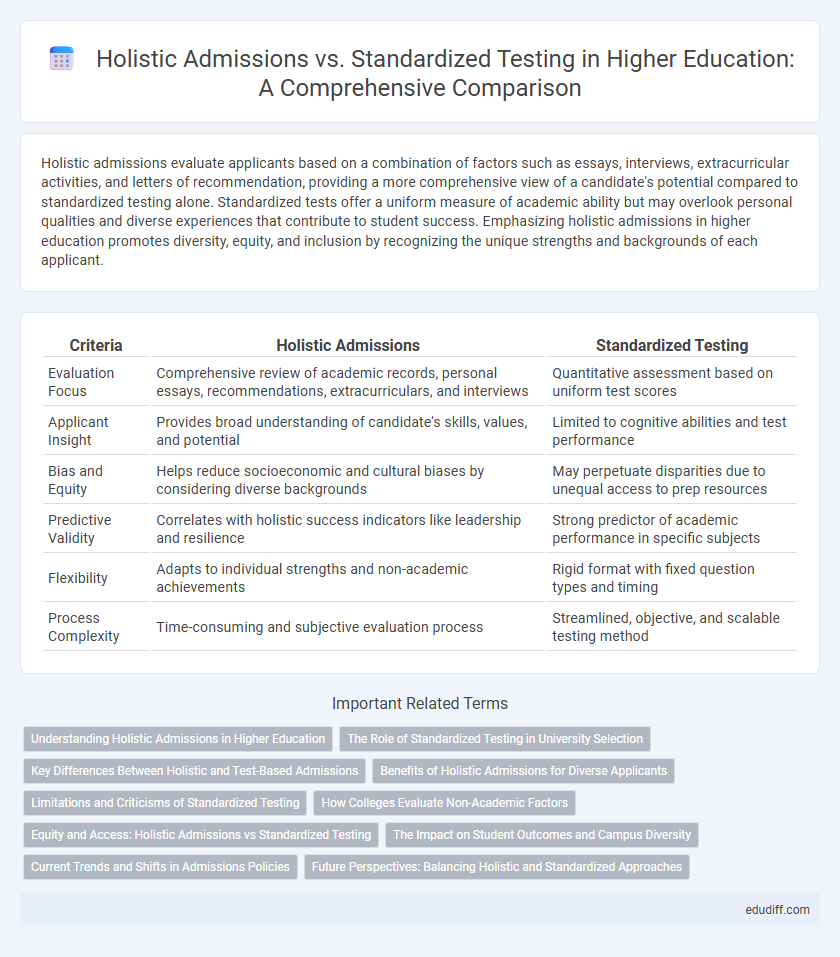Holistic admissions evaluate applicants based on a combination of factors such as essays, interviews, extracurricular activities, and letters of recommendation, providing a more comprehensive view of a candidate's potential compared to standardized testing alone. Standardized tests offer a uniform measure of academic ability but may overlook personal qualities and diverse experiences that contribute to student success. Emphasizing holistic admissions in higher education promotes diversity, equity, and inclusion by recognizing the unique strengths and backgrounds of each applicant.
Table of Comparison
| Criteria | Holistic Admissions | Standardized Testing |
|---|---|---|
| Evaluation Focus | Comprehensive review of academic records, personal essays, recommendations, extracurriculars, and interviews | Quantitative assessment based on uniform test scores |
| Applicant Insight | Provides broad understanding of candidate's skills, values, and potential | Limited to cognitive abilities and test performance |
| Bias and Equity | Helps reduce socioeconomic and cultural biases by considering diverse backgrounds | May perpetuate disparities due to unequal access to prep resources |
| Predictive Validity | Correlates with holistic success indicators like leadership and resilience | Strong predictor of academic performance in specific subjects |
| Flexibility | Adapts to individual strengths and non-academic achievements | Rigid format with fixed question types and timing |
| Process Complexity | Time-consuming and subjective evaluation process | Streamlined, objective, and scalable testing method |
Understanding Holistic Admissions in Higher Education
Holistic admissions in higher education evaluate applicants based on a comprehensive review of academic achievements, extracurricular involvement, personal essays, recommendations, and life experiences, rather than relying solely on standardized test scores like the SAT or ACT. This approach aims to identify diverse talents, potential contributions to campus community, and resilience, recognizing that academic metrics alone may not fully capture a student's capabilities. Institutions adopting holistic review strategies often see increased enrollment of underrepresented groups and richer campus diversity, aligning admissions with institutional values beyond quantitative benchmarks.
The Role of Standardized Testing in University Selection
Standardized testing remains a critical component in university selection, providing objective metrics to evaluate applicants' academic abilities across diverse backgrounds. These tests offer universities a uniform benchmark to assess readiness and potential success in higher education programs. Despite criticisms, standardized scores help balance holistic admissions by complementing qualitative factors like essays, recommendations, and extracurricular achievements.
Key Differences Between Holistic and Test-Based Admissions
Holistic admissions evaluate applicants based on multiple factors including extracurricular activities, personal essays, letters of recommendation, and interviews, offering a comprehensive view of the candidate beyond academic scores. Standardized testing relies heavily on quantifiable exam results such as the SAT or ACT to determine eligibility and academic preparedness. The key difference lies in holistic admissions emphasizing personal qualities and diverse achievements, while test-based admissions prioritize uniform metrics for comparison.
Benefits of Holistic Admissions for Diverse Applicants
Holistic admissions recognize diverse applicants by evaluating multiple factors such as personal essays, extracurricular activities, and life experiences, providing a fuller picture beyond test scores. This approach reduces biases inherent in standardized testing, which often disadvantages underrepresented and low-income students. Schools adopting holistic reviews foster inclusive campuses by admitting students with varied backgrounds and perspectives, enriching the academic environment.
Limitations and Criticisms of Standardized Testing
Standardized testing often faces criticism for its limited ability to capture a student's full potential, as it primarily assesses memorization and test-taking skills rather than creativity or critical thinking. These tests may perpetuate inequities by disadvantaging students from diverse socioeconomic backgrounds due to varying access to test preparation resources. Moreover, reliance on standardized scores can lead to high-stakes pressure, negatively impacting student well-being and driving educational practices toward teaching to the test rather than fostering comprehensive learning.
How Colleges Evaluate Non-Academic Factors
Colleges increasingly emphasize holistic admissions by assessing non-academic factors such as leadership roles, extracurricular activities, community service, and personal essays to gain a comprehensive understanding of applicants. Admissions officers evaluate qualities like resilience, creativity, and character, which standardized tests fail to capture, providing a more nuanced view of student potential. This approach allows institutions to identify well-rounded candidates who contribute positively to campus diversity and culture beyond academic metrics.
Equity and Access: Holistic Admissions vs Standardized Testing
Holistic admissions prioritize equity and access by evaluating diverse aspects of a student's background, achievements, and potential beyond test scores, enabling institutions to recognize unique talents and overcome socioeconomic barriers. In contrast, standardized testing often reflects disparities linked to race, income, and educational opportunities, limiting access for underrepresented groups. Shifting towards holistic review processes promotes inclusivity by considering contextual factors that standardized tests may overlook.
The Impact on Student Outcomes and Campus Diversity
Holistic admissions processes evaluate a wide range of student qualities beyond test scores, leading to increased campus diversity by recognizing diverse talents and backgrounds often overlooked by standardized testing. Studies show that holistic admissions correlate with higher retention rates and improved student engagement, as students admitted through these methods tend to have stronger interpersonal skills and resilience. Conversely, reliance on standardized testing can limit access for underrepresented populations, narrowing the educational pipeline and reducing overall campus inclusivity.
Current Trends and Shifts in Admissions Policies
Holistic admissions increasingly prioritize diverse experiences, leadership, and personal qualities over standardized test scores, reflecting a shift towards evaluating the whole applicant. Many universities have adopted test-optional or test-blind policies, responding to concerns about equity and access. Current trends highlight a growing emphasis on contextual factors such as socioeconomic background, community involvement, and resilience in admissions decisions.
Future Perspectives: Balancing Holistic and Standardized Approaches
Future perspectives in higher education emphasize integrating holistic admissions with standardized testing to create a balanced evaluation framework that captures diverse student strengths and potential. Combining qualitative insights from holistic reviews, such as extracurricular achievements and personal essays, with quantitative data from standardized tests enhances predictive validity for academic success. Institutions adopting this blended approach aim to foster equity and inclusivity while maintaining rigorous academic standards.
Holistic Admissions vs Standardized Testing Infographic

 edudiff.com
edudiff.com